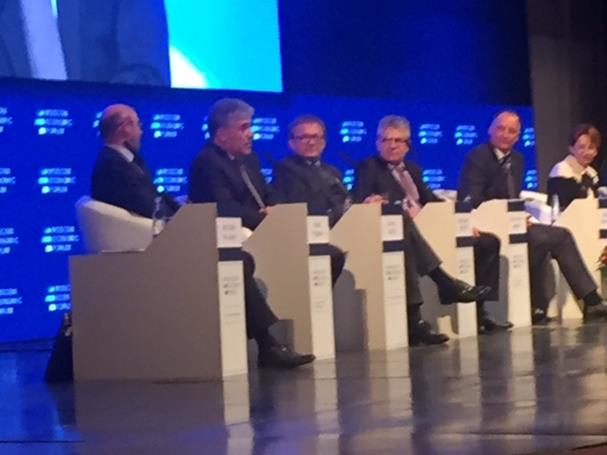The first day of this year’s Moscow Economic Forum (MEF, April 3-4), the premium gathering of Russian and foreign business leaders, economic strategists and geopolitical analysts, started with a plenary session reminiscent of the opening of last year’s event. Speaker after speaker complained that President Putin has no coherent strategy for Russia’s comprehensive development, and that the government is still beholden to an obsolete and deeply flawed economic and social model based on the Western orthodoxy imported in the 1990’s.
In his introductory remarks, MEF co-chairman and head of the Federation Council for Industrial Development Konstantin Babkin minced no words: “We have no strategy!” He told the audience of 1,500 at the GMU (Moscow State University) that “liberalism is still prevalent in all spheres. The system allows enormous riches for a few individuals, but our nation’s resources are not used for development.” Babkin illustrated his point by the gap between the government’s constant promises of easy loans for the country’s farmers, whose role is literally vital in countering the sanctions, and the fact that commercial banks are persistently not granting them. This has caused a 30 percent drop in the sales of agricultural machinery over the past year, with interest rates in excess of 7% making Russia’s farmers reluctant to invest.
Alexander Sergeyev, President of the Russian Academy of Sciences, focused on the need for the country’s growth rates to exceed world average. Russia still accounts for only two percent of the global economy, almost the same as a quarter of a century ago. He said that Russia has an enormously talented scientific community, but that its potential remains untapped because the state is not engaged in financing projects which do not attract Russia’s notoriously risk-averse private investors. Sergeyev pointed out that the economy is still largely based on natural resources, and insisted that the way forward should entail some form of coordination between the government and corporation, broadly based on the South Korean model.
One of Russia’s leading economists Sergei Glazyev—still one of Putin’s economic advisors, even though he is highly critical of the Medvedev government policy and his advice is generally unheeded—focused his presentation on the inability of the central bank to grasp that money is the fuel for growth. Glazyev insisted that Russia can build all the vehicles and aircraft she needed, and that a country aspiring to be developed cannot export unprocessed resources. Both he and Oksana Dimitrieva, a legislator from St. Petersburg, singled out the cost of credit and the widening gap between profits and investment as sure signs that Russia’s private bankers cannot be relied upon to provide liquidity for a new investment cyclus.
The panel included two presidential candidates at last month’s election, Pavel Grudinin the communist on the “left,” and Boris Titov the entrepreneur on the “right.” Their exposes were predictably different in emphasis, but both agreed that the decision-making elite’s subservience to the neoliberal economic and social consensus was a disaster which has cost Russia dearly over the decades—and continues to hinder her ability to adjust her global geopolitical stature to her as yet untapped economic potential. Grudinin insisted that Putin has no economic program but simply muddles through. Trade is ostensibly booming—shopping malls keep mushrooming all over the country—but production is suffering. Both he and Titov agreed that some degree of aggregate demand stimulation is a must. In fact everyone agreed that the Russian government has to ease the tax burden, reduce the cost of borrowing and energy resources, and introduce protective mechanisms for the domestic manufacturing sector.
It seems clear that Russia needs structural reforms. The basis of state policy is controlling inflation and keeping unemployment artificially low, which hinders real growth and results in a permanent state of crisis. It is necessary to finance large projects, most of all infrastructure – high-speed railways, six-lane highways. If the state does not act, Russia’s lagging behind the world’s leading economies will only grow in the coming years.
The second plenary panel on global affairs included interesting presentations by both Russian and foreign analysts. Ruslan Grinberg, the moderator, offered a grim assessment of Russia’s relations with the West and asked the panelists for their diagnoses and recommendations. Valery Garbuzov of the USA and Canada Institute opined that the problem was structural, and unconnected to any specific set of Russia’s policies: her striving to be accepted as a sovereign power with legitimate regional interests was inherently unacceptable to the global hegemonist establishment in Washington. Former Polish finance minister and deputy premier Grzegorz Kolodko expressed regret that Europe has succumbed to the pressure to join the anti-Russian bandwagon, but sounded a modestly optimistic note that in the fullness of time this may yet be reversed. No such optimism was shared by Thierry Mariani, former French transport minister, who thinks that we may be in for a long period of confrontation which will be a clear minus-sum game for all Europeans. This was also the view of Falk Tischendorf, who represents the German state of Mecklenburg-Western Pomerania in Moscow.
My turn tomorrow (Wednesday), on two panels: “Russia and the World Order” (morning) and “Sovereignty, Identity, Globalism” (afternoon). Watch this space.

Leave a Reply